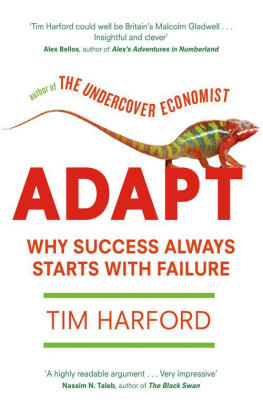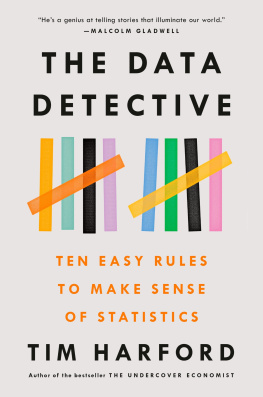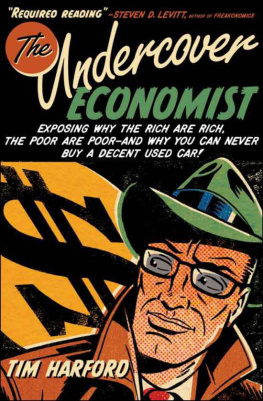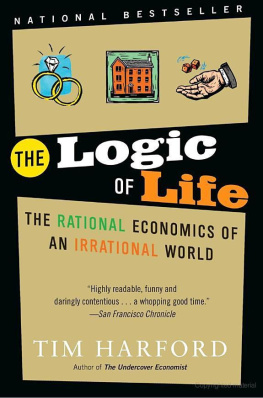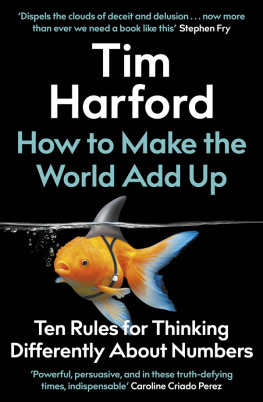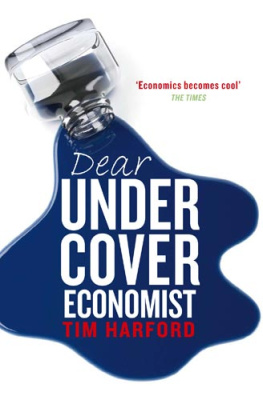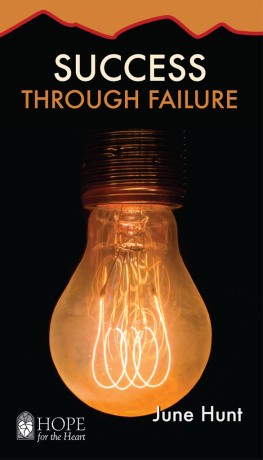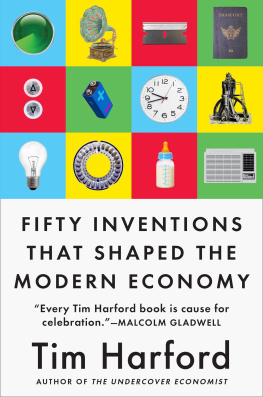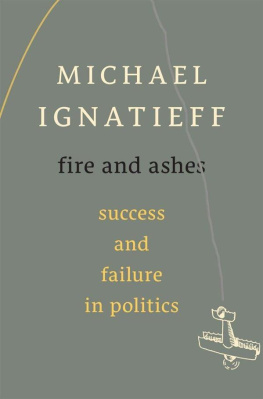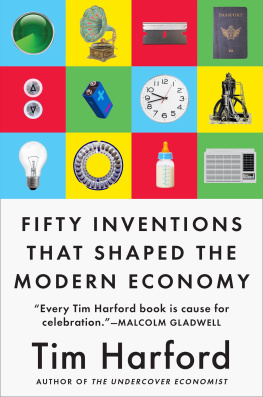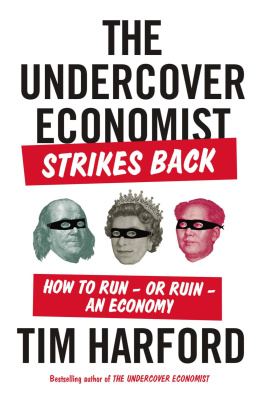Tim Harford - Adapt: Why Success Always Starts with Failure
Here you can read online Tim Harford - Adapt: Why Success Always Starts with Failure full text of the book (entire story) in english for free. Download pdf and epub, get meaning, cover and reviews about this ebook. year: 2011, publisher: Farrar, Straus and Giroux, genre: Politics. Description of the work, (preface) as well as reviews are available. Best literature library LitArk.com created for fans of good reading and offers a wide selection of genres:
Romance novel
Science fiction
Adventure
Detective
Science
History
Home and family
Prose
Art
Politics
Computer
Non-fiction
Religion
Business
Children
Humor
Choose a favorite category and find really read worthwhile books. Enjoy immersion in the world of imagination, feel the emotions of the characters or learn something new for yourself, make an fascinating discovery.
- Book:Adapt: Why Success Always Starts with Failure
- Author:
- Publisher:Farrar, Straus and Giroux
- Genre:
- Year:2011
- Rating:5 / 5
- Favourites:Add to favourites
- Your mark:
- 100
- 1
- 2
- 3
- 4
- 5
Adapt: Why Success Always Starts with Failure: summary, description and annotation
We offer to read an annotation, description, summary or preface (depends on what the author of the book "Adapt: Why Success Always Starts with Failure" wrote himself). If you haven't found the necessary information about the book — write in the comments, we will try to find it.
Adapt: Why Success Always Starts with Failure — read online for free the complete book (whole text) full work
Below is the text of the book, divided by pages. System saving the place of the last page read, allows you to conveniently read the book "Adapt: Why Success Always Starts with Failure" online for free, without having to search again every time where you left off. Put a bookmark, and you can go to the page where you finished reading at any time.
Font size:
Interval:
Bookmark:
Tim Harford has done it again he has produced another excellent book full of insight and surprise. Just when you were ready to write off economists, Adapt shows how broad and useful their thinking can be. I wish I had written this book
Evan Davis, presenter of the Today programme
Tim Harford could well be Britains Malcolm Gladwell. An entertaining mix of popular economics and psychology, this excellently written book contains fascinating stories of success and failure that will challenge your assumptions. Insightful and clever
Alex Bellos, author of Alexs Adventures in Numberland
Adapt is a highly readable, even entertaining, argument against top-down design. It debunks the Soviet-Harvard command-and-control style of planning and approach to economic policies and regulations, and vindicates trial-and-error (particularly the error part in it) as a means to economic and general progress. Very impressive!
Nassim N. Taleb, author of The Black Swan and Fooled by Randomness
This is a brilliant and fascinating book Harfords range of research is both impressive and inspiring, and his conclusions are provocative. The message about the need to accept failure has important implications, not just for policy making but also for peoples professional and personal lives. It should be required reading for anyone serving in government, working at a company, trying to build a career or simply trying to navigate an increasingly complex world
Gillian Tett, US Managing Editor, Financial Times, and author of Fools Gold
Tim Harford has made a compelling and expertly informed case for why we need to embrace risk, failure, and experimentation in order to find great ideas that will change the world. I loved the book
Dan Ariely, author of Predictably Irrational and The Upside of Irrationality
Harfords wide-ranging look at social adaptation is fresh, creative, and timely
Sheena Iyengar, author of The Art of Choosing
In a world that craves certainty, Harford makes a compelling case for why we cant have it. A brilliant and oddly empowering book
Dave Gorman, author of Dave Gorman vs The Rest of the World
Published by Hachette Digital
ISBN: 978-0-48-11604-1
All characters and events in this publication, other than those clearly in the public domain, are fictitious and any resemblance to real persons, living or dead, is purely coincidental.
Copyright Tim Harford 2011
All rights reserved. No part of this publication may be reproduced, stored in a retrieval system, or transmitted, in any form or by any means, without the prior permission in writing of the publisher.
Hachette Digital
Little, Brown Book Group
100 Victoria Embankment
London, EC4Y 0DY
www.hachette.co.uk
To Jess, Sophy and Emily, with love
The curious task of economics is to demonstrate to men how little they really know about what they imagine they can design.
Friedrich von Hayek
Cross the river by feeling for stones.
Attributed to Deng Xiaoping
The electric toaster seems a humble thing. It was invented in 1893, roughly halfway between the appearance of the light bulb and that of the aeroplane. This century-old technology is now a household staple. Reliable, efficient toasters are available for less than an hours wage.
Nevertheless, Thomas Thwaites, a postgraduate design student at the Royal College of Art in London, discovered just what an astonishing achievement the toaster is when he embarked on what he called the Toaster Project. Quite simply, Thwaites wanted to build a toaster from scratch. He started by taking apart a cheap toaster, to discover that it had over four hundred components and sub-components. Even the most primitive model called for:
Copper, to make the pins of the electric plug, the cord, and internal wires. Iron to make the steel grilling apparatus, and the spring to pop up the toast. Nickel to make the heating element. Mica (a mineral a bit like slate) around which the heating element is wound, and of course plastic for the plug and cord insulation, and for the all important sleek looking casing.
The scale of the task soon became clear. To get iron ore, Thwaites had to travel to an old mine in Wales that now serves as a museum. He tried to smelt the iron using fifteenth-century technology, and failed dismally. He fared no better when he replaced bellows with hairdryers and a leaf-blower. His next attempt was even more of a cheat: he used a recently patented smelting method and two microwave ovens, one of which perished in the attempt, to produce a coin-sized lump of iron.
Plastic was no easier. Thwaites tried but failed to persuade BP to fly him out to an offshore rig to collect some crude oil. His attempts to make plastic from potato starch were foiled by mould and hungry snails. Finally, he settled for scavenging some plastic from a local dump, melting it down and moulding it into a toasters casing. Other short cuts followed. Thwaites used electrolysis to obtain copper from the polluted water of an old mine in Anglesey, and simply melted down some commemorative coins to produce nickel,eleh he drew into wire using a specialised machine from the RCAs jewellery department.
Such compromises were inevitable. I realised that if you started absolutely from scratch, you could easily spend your life making a toaster, he admitted. Despite his Herculean efforts to duplicate the technology, Thomas Thwaitess toaster looks more like a toaster-shaped birthday cake than a real toaster, its coating dripping and oozing like an icing job gone wrong. It warms bread when I plug it into a battery, he told me, brightly. But Im not sure what will happen if I plug it into the mains. Eventually, he summoned up the courage to do so. Two seconds later, the toaster was toast.
The modern world is mind-bogglingly complicated. Far simpler objects than a toaster involve global supply chains and the coordinated efforts of many individuals, scattered across the world. Many do not even know the final destination of their efforts. As a lumberjack fells a giant of the Canadian forest, he doesnt know whether the tree he topples will make bed frames or pencils. At the vast Chuquicamata mine in Chile, a yellow truck the size of a house growls up an incline blasted into the landscape; the driver does not trouble himself to ask whether the copper ore he carries is destined for the wiring of a toaster or the casing of a bullet.
The range of products, too, is astounding. There are a hundred thousand or so distinct items in an ordinary Wal-Mart. Eric Beinhocker, a complexity researcher at the McKinsey Global Institute, reckons that if you were to add up all the different sizes and shapes of shoes, shirts and socks, the different brands and flavours and sizes of jams and sauces, the millions of different books, DVDs and music downloads on offer, you would find that a major economy such as New York or London offers over ten billion distinct types of product. Many of these products were undreamt of when the toaster was first invented, and millions of new ones appear every month. The complexity of the society we have created for ourselves envelops us so completely that, instead of being dizzied, we take it for granted.
I used to view this sophistication as cause to celebrate. Now I am less sure. Certainly, this complex economy produces vast material wealth. Not everyone gets a share, but far more people today enjoy a high material standard of living than at any time in history; and, notwithstanding the occasional recession, the wealth continues to grow more quickly than it ever used to. The process that produces this wealth is near miraculous, and the job is far harder than we tend to acknowledge. Alternative systems, from feudalism to central planning, have attempted the same task and been consigned to the history books.
Next pageFont size:
Interval:
Bookmark:
Similar books «Adapt: Why Success Always Starts with Failure»
Look at similar books to Adapt: Why Success Always Starts with Failure. We have selected literature similar in name and meaning in the hope of providing readers with more options to find new, interesting, not yet read works.
Discussion, reviews of the book Adapt: Why Success Always Starts with Failure and just readers' own opinions. Leave your comments, write what you think about the work, its meaning or the main characters. Specify what exactly you liked and what you didn't like, and why you think so.

